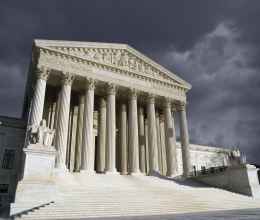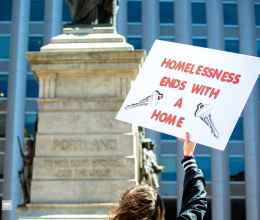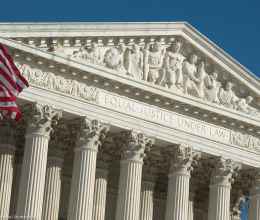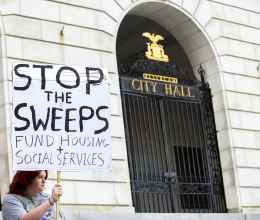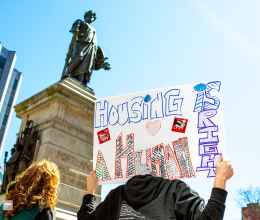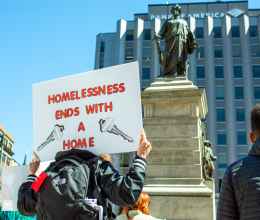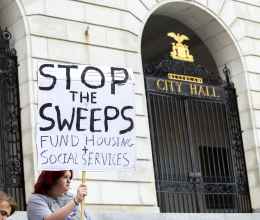By Brian Arborio, homeless in Maine, author, human rights activist, and promoter of healthy lifestyles and harmonious communities.
This piece originally appeared in a speacial to the Maine Sunday Telegram (Portland Press Herald).
Justice, fair and blind, forbids both the rich and poor equally from sleeping in public.
After surviving the past three years unhoused, it seemed impossible I’d be standing at the Supreme Court. Yet there I was, rallying with housing justice advocates and building the movement to end homelessness.
Being at the court was a world away from life on the streets. I went from getting spit on, beaten and ignored with contempt by the public and police, to standing before the nation’s highest court and touring the Capitol with Senate staff.
I rallied in front of the Supreme Court for the most consequential homelessness case in over 40 years: Johnson v. City of Grants Pass.
This case will affect more than 650,000 people experiencing homelessness. At stake is the right of unhoused people to exist – and survive – in public spaces, on land that belongs to all of us, even the poorest among us. Can cities punish the unhoused for life-sustaining acts, like sleeping in public, when they have no alternative shelter? The court will decide this pressing issue when considering if the Eighth Amendment’s protections against “cruel and unusual punishment” extend to unhoused and housed people equally.
Housed people pass by the growing number of unsheltered people in their communities, assuming we’re on the streets by choice. But for me, it wasn’t voluntary. This false narrative – that people choose to live in the danger and trauma of homelessness – was central to the oral arguments made before the court in this case.
Before I ended up on the streets, I had “played by the rules.” I had resources, went to college, had a white-collar job and paid rent on time, even prepaying six months in advance in 2021. Yet I was evicted as soon as pandemic-era moratoriums expired. I thought my savings and references would get me a new place quickly. I figured I’d be on the streets for a couple of weeks.
I was wrong.
Weeks turned into years. I became unrecognizable. Friends, family and society turned against me. Five months ago, I faced a third winter outdoors, with battered shoes, a slashed tent and another sleeping bag ruined by pepper spray – law enforcement’s cheap solution to moving us homeless types “down the road.”
I visited emergency rooms and begged for help, only to be turned back out into the cold night. Luckily, compassionate people from the local community and social media, who owed me nothing, kept me going with kindness and material support.
My trip to Washington, D.C., was another step in my journey to recover from the dehumanization of homelessness and reconnect to my power. I toured the Supreme Court and Capitol, sharing my experiences with staff. Just six months ago, I couldn’t get a state ID or birth certificate because I had no mailing address. Yet there I was, holding a card reading, “United States Senate, Admit Brian Christopher Arborio to the Senate Gallery.” Now that I have returned, I will be advocating with housed and unhoused advocates to end homelessness here in Maine.
To end our homelessness crisis, Portland must address homelessness with affordable housing, not handcuffs. I survived years of unsheltered homelessness in Portland. I know how hard it is to live on Portland’s streets. I know what will and won’t work to address this crisis.
Portland City Council has repeatedly committed to the goal of equitable policymaking. But the city’s ordinances and camping ban target unhoused residents and sabotage these efforts. Barriers to housing, health care and jobs disproportionately push people of color, LGBTQ+ youth and people with disabilities into homelessness. Instead of addressing structural injustices, Portland forcibly displaces people, takes their belongings and destroys their property. The city’s response is cruel, counterproductive and wasteful.
No matter the Supreme Court’s decision in Grants Pass, Portland’s leaders have a choice. They can address the root causes of homelessness with humane solutions or continue trying to punish and criminalize people out of poverty.
For justice to be truly equal, the law must protect all people just the same – whether they can afford housing or not. My trip to Washington showed me that the marble halls of power, walked by people whose decisions affect our lives, are also our halls. Some of the arguments raised in Grants Pass deny the humanity of unhoused people. But there I was, sharing space with housing justice advocates at the court and proving my humanity in the face of those inhumane.

